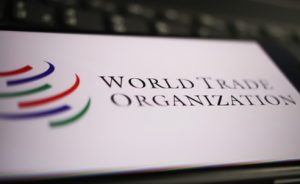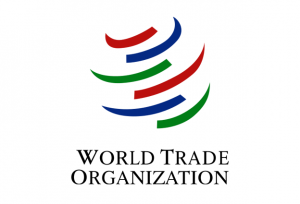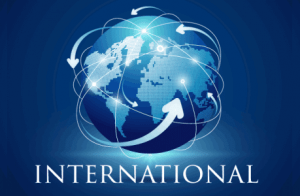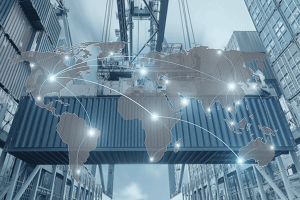World Trade Organization
Global Uncertainty Challenges World Trade as Inflation Cools
• The global economy continues to improve gradually as inflation cools, while notable differences in economic performances persist across economies and regions. World merchandise trade is expected to increase by 3% in 2025 with an expected increase overall of 2.7% for 2024
• Notable risks to global economic growth continue to be escalation of geopolitical conflicts in Europe and the Middle East, regional conflicts, and policy uncertainty.
Background
 California is the fifth largest economy in the world with a gross state product pushing $4 trillion. International trade and investment are major parts of our economic engine that broadly benefit businesses, communities, consumers and state government. California’s economy is diverse, and the state’s prosperity is tied to exports and imports of both goods and services by California-based companies, to exports and imports through California’s transportation gateways, and to movement of human and capital resources.
California is the fifth largest economy in the world with a gross state product pushing $4 trillion. International trade and investment are major parts of our economic engine that broadly benefit businesses, communities, consumers and state government. California’s economy is diverse, and the state’s prosperity is tied to exports and imports of both goods and services by California-based companies, to exports and imports through California’s transportation gateways, and to movement of human and capital resources.
Although trade is a nationally determined policy issue, its impact on California is immense. In 2023, California exported to 227 foreign markets. Trade offers the opportunity to expand the role of California’s exports. In its broadest terms, trade can literally feed the world and raise the living standards of those around us.
In 2023, California exported $178.71 billion to 227 foreign economies. California’s top export markets are Mexico, Canada, China, Japan and South Korea.
World Trade Organization
The World Trade Organization (WTO) is the only global international organization dealing with the rules of trade between nations. Its main function is to ensure that trade flows as smoothly, predictably and freely as possible. At its heart are the WTO agreements, negotiated and signed by the bulk of the world’s trading nations, and ratified or approved in their parliaments or legislatures.
The WTO is a multilateral treaty subscribed to by 166 governments, which together account for 90% of world trade (with more than 20 nations negotiating their accession).
The basic aim of the WTO is to liberalize world trade and place it on a secure foundation, thereby contributing to economic growth and development, and to the welfare of people around the world.
Anticipated Action
The WTO is expected to stay on the path to attempt to achieve a functioning dispute settlement system. Its discussion on the Agreement on Fishery Subsidies and Strategy 2023 also is expected to continue. Director General Ngozi Okonio-Iweala was re-elected for a second term in 2024, with conversations on WTO reform expected to continue in 2025. The 14th Ministerial Conference (MC14) will take place March 26–29, 2026 in Cameroon —– the second MC to be hosted by an African country.
In the United States, the White House is required to send a report to Congress evaluating U.S. membership in the organization every five years. Following the report, members of Congress may introduce legislation opposing U.S. membership. This is due in 2025. Multilateral organizations like the WTO are under increasing pressure from President Donald Trump, as they appear to hold little significance for him.
CalChamber Position
The California Chamber of Commerce supports free trade worldwide, expansion of international trade and investment, fair and equitable market access for California products abroad, and elimination of disincentives that impede the international competitiveness of California business,
The CalChamber promotes subnational diplomacy, as it builds more layers and durability into the fabric of the United States’ international partnerships and thickens the country’s global diplomacy by building lasting relationships among leaders at many levels.
The CalChamber supports a National Free Trade Agenda with trade being a priority:
• Support U.S. engagement in the World Trade Organization to make it a meaningful forum — while ensuring an adequate dispute settlement mechanism and confirming that our trading partners adhere to fair and transparent trade practices while being held accountable if they violate international rules.
• Support renewal of Trade Promotion Authority so that the President of the United States may negotiate new multilateral, sectoral and regional trade agreements, ensuring that the United States may continue to gain access to world markets, resulting in an improved economy and additional employment of Americans.
• Seek commercially meaningful outcomes in negotiations with regions around the world: the Americas, Europe, Asia-Pacific, and Africa. Support bilateral, regional, and multilateral trade agreements — which are critical to consumers, workers, businesses, farmers and ranchers and would allow the United States to compete with other countries that are negotiating agreements with each other.
• Continue focus on lowering tariffs and nontariff barriers to support the expansion of American exports. While strategic use of tariffs or the threat of tariffs may be a meaningful negotiation tool, support efforts to reduce taxation and regulatory burden as a means to create jobs and economic growth.
• Support full funding of the federal international affairs budget to advance U.S. economic interests, national security, and humanitarian values.
February 2025
Agriculture and Resources
California Environmental Quality Act (CEQA)
Climate Change
Education
Energy
Environmental Regulation
Health Care
Housing and Land Use
Immigration Reform
International Trade
Labor and Employment
Legal Reform
Managing Employees
Privacy
Product Regulation
Taxation/Budget
Tourism
Transportation
Unemployment Insurance/Insurance
Water
Workers’ Compensation
Workplace Safety
Recent News
International Bills
- Federal Bills
- 2025-2026 Bills
- 2023-2024 Bills
- 2021-2022 Bills
- 2019-2020 Bills
- 2017-2018 Bills
- 2015-2016 Bills
Councils
Coalitions
- Alliance for Fair Trade with India
- California Coalition for Free Trade
- Federation of International Trade Associations
- North American Rebound
- Trade Works for US
- U.S. Council for International Business (USCIB)
- USA * Engage
Policy Contact
 Susanne Stirling
Susanne Stirling
Senior Vice President, International Affairs





